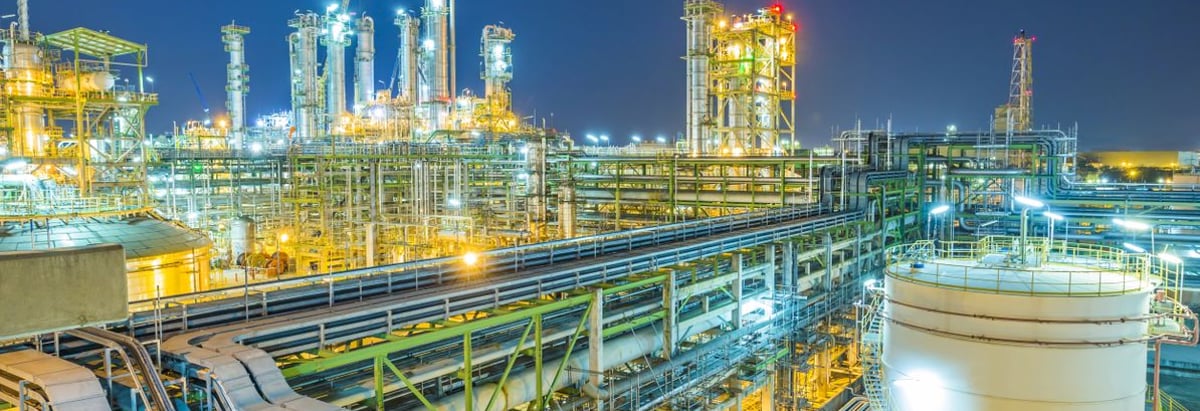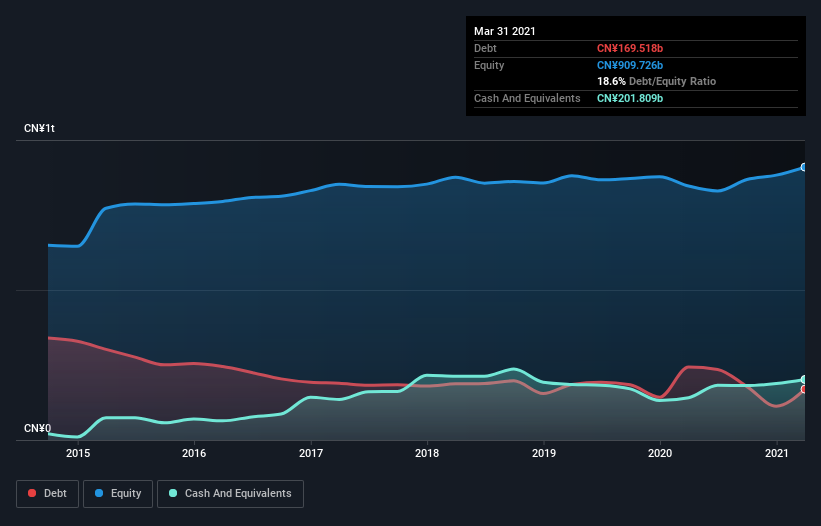
The external fund manager backed by Berkshire Hathaway's Charlie Munger, Li Lu, makes no bones about it when he says 'The biggest investment risk is not the volatility of prices, but whether you will suffer a permanent loss of capital.' It's only natural to consider a company's balance sheet when you examine how risky it is, since debt is often involved when a business collapses. We note that China Petroleum & Chemical Corporation (HKG:386) does have debt on its balance sheet. But is this debt a concern to shareholders?
What Risk Does Debt Bring?
Debt assists a business until the business has trouble paying it off, either with new capital or with free cash flow. If things get really bad, the lenders can take control of the business. However, a more frequent (but still costly) occurrence is where a company must issue shares at bargain-basement prices, permanently diluting shareholders, just to shore up its balance sheet. Of course, the upside of debt is that it often represents cheap capital, especially when it replaces dilution in a company with the ability to reinvest at high rates of return. When we examine debt levels, we first consider both cash and debt levels, together.
See our latest analysis for China Petroleum & Chemical
How Much Debt Does China Petroleum & Chemical Carry?
You can click the graphic below for the historical numbers, but it shows that China Petroleum & Chemical had CN¥169.5b of debt in March 2021, down from CN¥243.0b, one year before. But it also has CN¥201.8b in cash to offset that, meaning it has CN¥32.3b net cash.

How Healthy Is China Petroleum & Chemical's Balance Sheet?
The latest balance sheet data shows that China Petroleum & Chemical had liabilities of CN¥559.7b due within a year, and liabilities of CN¥332.7b falling due after that. Offsetting this, it had CN¥201.8b in cash and CN¥56.9b in receivables that were due within 12 months. So it has liabilities totalling CN¥633.7b more than its cash and near-term receivables, combined.
Given this deficit is actually higher than the company's massive market capitalization of CN¥459.3b, we think shareholders really should watch China Petroleum & Chemical's debt levels, like a parent watching their child ride a bike for the first time. In the scenario where the company had to clean up its balance sheet quickly, it seems likely shareholders would suffer extensive dilution. China Petroleum & Chemical boasts net cash, so it's fair to say it does not have a heavy debt load, even if it does have very significant liabilities, in total.
Even more impressive was the fact that China Petroleum & Chemical grew its EBIT by 127% over twelve months. That boost will make it even easier to pay down debt going forward. The balance sheet is clearly the area to focus on when you are analysing debt. But it is future earnings, more than anything, that will determine China Petroleum & Chemical's ability to maintain a healthy balance sheet going forward. So if you're focused on the future you can check out this free report showing analyst profit forecasts.
But our final consideration is also important, because a company cannot pay debt with paper profits; it needs cold hard cash. While China Petroleum & Chemical has net cash on its balance sheet, it's still worth taking a look at its ability to convert earnings before interest and tax (EBIT) to free cash flow, to help us understand how quickly it is building (or eroding) that cash balance. Looking at the most recent three years, China Petroleum & Chemical recorded free cash flow of 48% of its EBIT, which is weaker than we'd expect. That's not great, when it comes to paying down debt.
Summing up
While China Petroleum & Chemical does have more liabilities than liquid assets, it also has net cash of CN¥32.3b. And we liked the look of last year's 127% year-on-year EBIT growth. So we don't have any problem with China Petroleum & Chemical's use of debt. The balance sheet is clearly the area to focus on when you are analysing debt. However, not all investment risk resides within the balance sheet - far from it. For instance, we've identified 1 warning sign for China Petroleum & Chemical that you should be aware of.
Of course, if you're the type of investor who prefers buying stocks without the burden of debt, then don't hesitate to discover our exclusive list of net cash growth stocks, today.
When trading stocks or any other investment, use the platform considered by many to be the Professional's Gateway to the Worlds Market, Interactive Brokers. You get the lowest-cost* trading on stocks, options, futures, forex, bonds and funds worldwide from a single integrated account. Promoted
New: AI Stock Screener & Alerts
Our new AI Stock Screener scans the market every day to uncover opportunities.
• Dividend Powerhouses (3%+ Yield)
• Undervalued Small Caps with Insider Buying
• High growth Tech and AI Companies
Or build your own from over 50 metrics.
This article by Simply Wall St is general in nature. We provide commentary based on historical data and analyst forecasts only using an unbiased methodology and our articles are not intended to be financial advice. It does not constitute a recommendation to buy or sell any stock, and does not take account of your objectives, or your financial situation. We aim to bring you long-term focused analysis driven by fundamental data. Note that our analysis may not factor in the latest price-sensitive company announcements or qualitative material. Simply Wall St has no position in any stocks mentioned.
*Interactive Brokers Rated Lowest Cost Broker by StockBrokers.com Annual Online Review 2020
Have feedback on this article? Concerned about the content? Get in touch with us directly. Alternatively, email editorial-team (at) simplywallst.com.
About SEHK:386
China Petroleum & Chemical
An energy and chemical company, engages in the oil and gas and chemical operations in Mainland China, Singapore, and internationally.
Good value with adequate balance sheet and pays a dividend.

